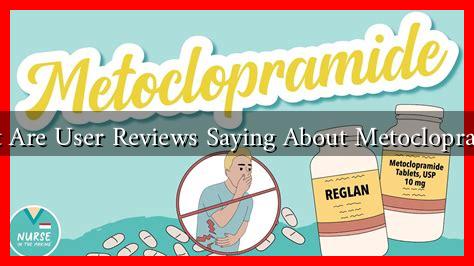-
Table of Contents
What Are User Reviews Saying About Metoclopramide?
Metoclopramide is a medication primarily used to treat nausea and vomiting, particularly in patients undergoing chemotherapy or surgery. It also aids in gastric emptying and is sometimes prescribed for gastroesophageal reflux disease (GERD). As with any medication, user reviews provide valuable insights into its effectiveness, side effects, and overall satisfaction. This article delves into what users are saying about Metoclopramide, highlighting both positive and negative experiences.
Understanding Metoclopramide
Before diving into user reviews, it’s essential to understand how Metoclopramide works. It acts as a dopamine receptor antagonist, which helps to increase the movement of the stomach and intestines. This action can alleviate symptoms of nausea and improve gastric emptying. However, like all medications, it comes with potential side effects and risks.
User Experiences: The Positive Side
Many users report positive experiences with Metoclopramide, particularly in its effectiveness for treating nausea and vomiting. Here are some common themes from user reviews:
- Effective Relief: A significant number of users praise Metoclopramide for its quick action in alleviating nausea, especially after surgery or chemotherapy. Many report feeling relief within 30 minutes of taking the medication.
- Improved Quality of Life: Users suffering from chronic nausea due to conditions like gastroparesis often note that Metoclopramide has dramatically improved their daily lives, allowing them to eat and engage in activities without fear of vomiting.
- Convenient Administration: The availability of Metoclopramide in various forms, including oral tablets and injections, is appreciated by users who prefer flexibility in how they take their medication.
User Experiences: The Negative Side
While many users have had positive experiences, there are also notable concerns and side effects reported by others. Here are some of the common negative aspects highlighted in reviews:
- Side Effects: Common side effects include drowsiness, fatigue, and dizziness. Some users have reported feeling excessively tired or experiencing mood changes, which can be particularly concerning for those who need to maintain alertness.
- Long-term Use Risks: Users have expressed concerns about the potential for long-term use leading to tardive dyskinesia, a serious movement disorder. This fear has led some to seek alternative treatments.
- Withdrawal Symptoms: A few users have reported experiencing withdrawal symptoms after discontinuing Metoclopramide, including increased nausea and anxiety.
Case Studies and Statistics
To further understand user experiences, several case studies and statistics can provide context. A study published in the Journal of Clinical Gastroenterology found that approximately 30% of patients using Metoclopramide for gastroparesis reported significant improvement in symptoms. However, the same study noted that 15% of participants experienced adverse effects severe enough to discontinue use.
Another survey conducted by a health website revealed that out of 100 users, 70% rated their experience with Metoclopramide as positive, while 30% reported dissatisfaction primarily due to side effects. This highlights the importance of monitoring and managing side effects when prescribing this medication.
Conclusion: Key Takeaways
User reviews of Metoclopramide present a mixed bag of experiences. While many individuals find it effective for managing nausea and improving their quality of life, others face significant side effects that can impact their overall satisfaction. Here are the key takeaways:
- Metoclopramide is generally effective for treating nausea and improving gastric emptying.
- Common side effects include drowsiness and fatigue, which can affect daily activities.
- Long-term use raises concerns about serious side effects, including tardive dyskinesia.
- Individual experiences vary widely, emphasizing the need for personalized medical advice.
As with any medication, it is crucial for users to consult healthcare professionals to weigh the benefits against potential risks. Understanding user reviews can help inform these discussions and lead to better treatment outcomes.

